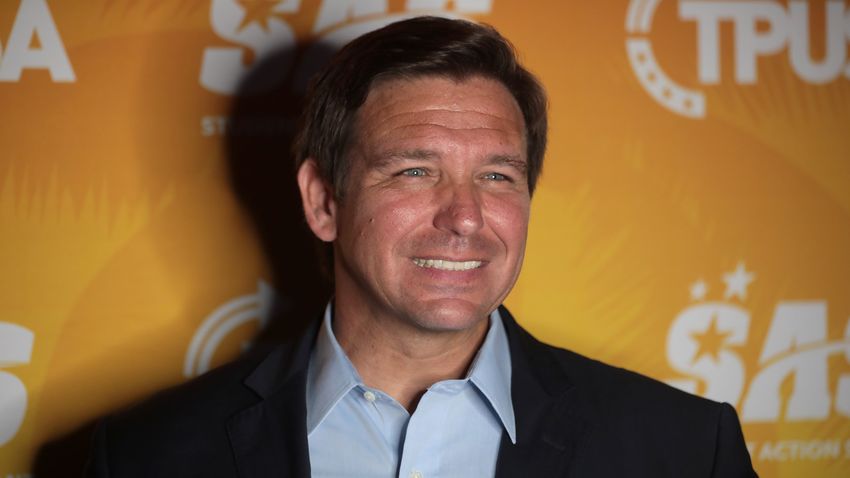The up-and-coming politician joins the conservative side in all culture war cases - now he is at war with the huge Disney in connection with the Florida law prohibiting gender propaganda - writes Magyar Nemzet, looking at Mandiner.
Cultural warfare is intensifying in the United States: Disney and Florida's Republican administration, fighting for the woke ideology, are using their entire arsenal against each other. During the fight, two important legal questions remain unanswered: what can a company afford in politics, and do companies also have freedom of speech?
Ron DeSantis ran for Florida governor with Donald Trump's endorsement and embraced all the culture war issues that fire up the Republican base.
Meanwhile, he handled the Covid epidemic in a pro-libertarian way and introduced tough laws against university education of woke indoctrination, hard-to-verify mail-in voting, and voting for people who can't show their ID. On policy issues, however, he moved to the middle, raised teacher salaries, did a lot to protect the Everglades National Park, and even supported the legalization of marijuana - thus building support for himself among Democratic voters. This is also what the Republican base expects from him: Trump's tough culture fight in a much more successful way than the ex-president, armed with policy competence and political fine motor skills - read the article published in the columns of Mandiner.
However, according to the far-left Vox magazine
DeSantis' role model is actually not Donald Trump - but Viktor Orbán.
As the paper knows, the legislation prohibiting gender propaganda in schools was modeled on the Hungarian pedophile law, and the social media law, which has since been before the court, was inspired by Judit Varga's proposal. So according to voxos journalist Zack Beauchamp
DeSantis is actually the inventor of "American Orbanism" - it remains to be seen whether the election results will be based on this.
But what is this big gender propaganda controversy in Florida? The story began at the beginning of March, when a bill was presented to the Florida House of Representatives to ban the teaching of sexual orientation and gender identity during the fourth grade and above in a way that is inappropriate for the age or development of the students, the Mandiner recalls.
House Bill 1557 immediately started the culture war familiar from home: according to the Republican state leadership, it is a Parental Rights in Education Act, and the LGBTQ organizations flying in alliance with the Democratic opposition are a "don't say gay" law (Don't Say Gay Bill) are talking.
The deliberately vague wording of the part concerning students older than the fourth grade is particularly stung by the LGBTQ lobby, because in America it is customary to litigate for everything - and it is precisely on such laws that a concerned parent who does not like the indoctrination of their child can initiate lengthy lawsuits.
That's when Florida's largest employer, The Walt Disney Company, which operates the huge Walt Disney World complex, entered the picture. Under pressure from workers, CEO Bob Chapek stepped in with Ron DeSantis on March 9. For decades, the company has been generously supporting the campaigns of both Democratic and Republican politicians and using its thirty-eight local lobbyists to get everything it wants from the state, but after the law was signed on March 28, it stopped funding Florida campaigns - and instead signaled that in the future will fight to abolish the law.
The governor didn't stay in Disney's debt: on April 22, he signed SB 4-C into law, which dissolved the Reedy Creek Development District effective next June - that 101 square kilometer "state within a state" on the border of Orange and Osceola counties, in which the Disney practically governs and taxes itself.
If Disney wants to fight, it's looking like the wrong guy, the governor wrote in a recent fundraising letter.
I will not let a woke company based in California run our state.
The DeSantis-Disney fiasco points to larger trends in American domestic politics: corporations are increasingly openly representing political ideologies, but they are also increasingly failing in this area - and conservative voters, left somewhat orphaned after the removal of Donald Trump, are rallying around leaders who are not afraid for companies to comply.
Ron DeSantis is not afraid, despite the fact that this is a break with the party's decade-long pro-business line, the Mandiner states.
Republican voters also drew their own conclusions from this: DeSantis is the most likely Republican presidential candidate after Trump, and former Vice President Pence is not in the running either.
Two surveys from April clearly show that if Trump does not run, DeSantis will clearly win the race for the Republican presidential nomination with support of around 30-35 percent, far ahead of Pence - but if Trump does run, he would still be second in the ratio of 57:15.
Source and full article: magyarnemzet.hu
Featured Image: Ron DeSantis/Photo: Flickr













